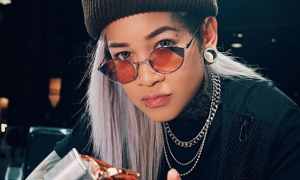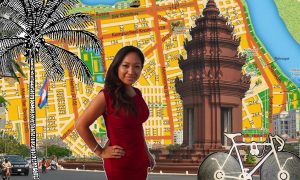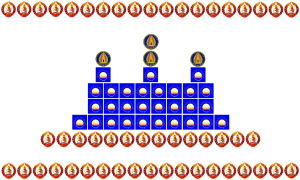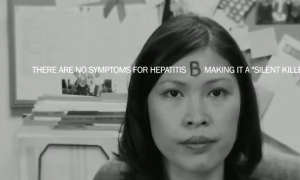Essay No. 4
Khmerican means showing the utmost respect to anyone that we as Khmer Americans encounter, no matter where we are. I believe that most people who are born into Khmer families in America (other countries too) are taught the importance of respect from the day they are born. And what I mean by respect are actions such as providing a very welcoming hospitality to any of our house guests, embracing people like family such as friends and acquaintances, and helping one another to the best of our ability. For me, my family has fulfilled those examples. For instance, my family and I always supply a water bottle to any guest that visits our house. And whenever we meet someone who we can engage with in a friendly matter, they gradually become like family to us. I believe that many Khmer American families fit that aspect of respect because there are many instances where I see many Khmer American people who are not technically related to someone. But because that someone is somewhat close to their family or just them, they may call that someone bong, ming, bu, puon, etc. and treat them like family regardless. And with the Cambodia Towns that have come into existence in past years, I believe that exemplifies how we as a people help each other to the best of our ability. Because those aspects of respect serve as a positive quality, I believe that maintaining and continuing to practice it is essential to our development as a community.
Progression after whatever hardship one had to endure also fits what into the mold of what I believe Khmerican means. To Cambodia becoming a fast-developing nation after her independence in 1953, to Cambodian Americans having to assimilate to the customs of America after large waves of them fled from the genocide, and then to finally obtaining two ethnic enclaves that show the heart of the Cambodian American community, those milestones depict and exemplify what Khmerican means in terms of progression after whatever hardship one had to endure. For myself, I always make sure that in whatever I do when it comes to work, school, or family duties, that the utmost effort is given because of the realization that my family is lucky to be alive. And on a broader scale, I believe that being alive is an opportunity for whoever is a second-generation Cambodian American. Because second generation Cambodian Americans would not exist if their families did not survive the genocide. And for that reason, putting the utmost effort and trying to progress is an important duty that we as Khmer Americas must enact on and not take for granted.
To sum it up, being respectful and always progressing are the two main factors of what I believe Khmerican means.
—
Essay No. 5
“I am Khmerican. The struggle of American culture against Cambodian culture. The struggle of traditional culture versus modern-day values. The struggle between my parents and myself.
Growing up in a primarily white community, I struggled in the search of my own identity. I only recently moved to Lowell, and I was so jealous of how Cambodian teens all hung around together and I only had one Cambodian friend. I am not your typical first generation Cambodian-American. From the age of 5 until I was about 13, Saturday mornings at 9 AM were Khmer lessons, reading and writing. English was not spoken in the house. These strict rules made me dread the weekends, waking up early to transcribe Khmer stories.
Looking back upon this, this was one of the few things that developed my growth. My bilingual skills have opened up so many doors for me to learn. I can converse with my grandparents and my whole family in Cambodia. I can speak with monks and learn about how to better myself. I was able to work in a Cambodian orphanage in Otres, Kampong Som, because I could speak Khmer. I will use my language and my higher education as a bridge between the Khmer immigrant populations to help their transition into American society.
I am saddened by the rapid loss of Cambodian culture, feeding my desires of giving back to the Khmer community. I would like this opportunity to experience Cambodia Town on the West Coast, reaching out to the Khmer community and creating a bridged platform to find students my age to share and preserve American culture.
—
Essay No. 6
Allow me to start by saying I am not Cambodian by any stretch; my views are based on my experiences and friendships in the Cambodian community. Growing up I’ve moved around a great deal, to cities like Revere and Fall River Massachusetts. There I had the opportunity to experience many sides of Cambodian culture, which is why the word “”Khmerican“” is such a great word to me. The first time I heard Khmerican was when two Cambodians used it in reference to their Americanized Cambodian friend. Yet, as time went on I saw this term applied in a much broader stroke, mostly to those who chose to gift the rest of the US with a piece of Cambodian culture, in Fall River there’s a Cambodian convenience store called Angkor that some started calling a “”Khmerican“” shop. They made a point of not only selling Cambodian groceries but also items that pretty much everyone else would buy like soda or paper towels. It was great because they undercut chain supermarkets, in turn they brought in more than Cambodians to their shop. I’d like to think that some people got adventurous and tried a winter melon, I know I tried some jack fruit chips.
But I think Khmerican is more than just groceries and exotic stuff. To me Khmerican isn’t exotic but rather quite normal. I like to think that every aspect of the Cambodian community and Cambodian society at large that interacts with the US is Khmerican. It’s the good and the bad; but mostly the good – just like every most every other ethnic group that I’ve come across. But Cambodian culture to me is more dynamic than most, certainly more than my ethnicity. Growing up with Cambodian friends taught me the value of your community in the US. My eventual goal is to become an immigration lawyer (I’m still and undergrad though), to help many groups but especially Cambodians. I hope to help with students visas to IR visas and beyond; the more Cambodians I meet the more I realize I’ve made the right education choice.
But I have only seen one aspect of America’s Cambodian community. I imagine Long Beach is vastly different from the Mills of Lowell and Fall River or the factories of Lynn and Revere. If selected I hope to make the most of my trip and apply it toward my education and in turn will use what I learn to help others. When all is said and done I hope to have a completely different definition of what Khmerican is and that my definition will continue to change the more I give to the Cambodian community what they have gifted to our society at large.
—
Essay No. 7
Growing up as a second-generation Cambodian American, filial piety was always at the forefront of my mind; to live in such a way that you honor those that you love. It was during these formative years in my early childhood that I was taught to stick to the status quo – i.e. help out with chores or errands, achieve high academic standards, and become gainfully employed in a venerable profession. However, as I entered my early adulthood, I began to realize that there was something about me that craved the presence of an unconventional life; the life that intersects different identities and communities into one. An internal conflict arose from within me, for I knew feeling the aforementioned meant that I would have to deviate from the status quo that had been drilled into my head from as far back as I can remember. Yet, I knew that this type of change for me would be inevitable, and how and when it would manifest was something that lingered with me for a long time.
Change began to enter my life in subtle ways and then snowballed into an amalgamation of new experiences. During my time in college at the University of Washington (UW) in Seattle, I sought out ways to become involved in the community and I became active in various student groups. I did well to stick to the status quo; I excelled academically, achieved a scholarship for nursing school, and I had a job lined up after graduation – I was essentially living the “American” dream. It was then that I realized that in working hard to achieve the goals that I set forth for myself, I somehow felt that I lost a bit of my authenticity as a Khmer American. I knew I wanted a find a place for myself in the Khmer community in the greater Seattle area.
Up until recently, my life has consisted of various constituents that I identified with and it has always been an uphill climb to somehow combine the communities that I’m a part of. I somehow have always felt there has been a balancing act between me interacting with the community at the UW and being able to interact with the Khmer community. I became involved with the Khmer Student Association (KhSA) at the UW and this helped to bridge the disconnect between the two. Now, after eight consecutive years of school, I am ready to take a hiatus from academia and explore/learn more about myself as a Khmer American, with the goal of ultimately visiting Cambodia one day. To me, this is what defines “Khmerican;” to be able to engage in positive discourse and personal introspection and realize the foundation of what my success in America has been built on while honoring and staying true to my Khmer roots. With this opportunity to visit a Cambodia town, I hope to facilitate personal growth and cultural enrichment, while continuing to establish an identity for myself and not forget where I come from.
—
Essay No. 8
In May of 2012, I was fortunate enough to travel to Cambodia. Before my trip, I didn’t have a complete understanding of the history of the nation except for what I had learned during my high school education about the Khmer Rouge. While traveling from Phnom Penh to Siem Reap by bus, a distant memory resurfaced from my adolescence. Like most pre-teens of the early Y-2K era, I had a Xanga blog account and through it I was able to meet other pre-teens from around the country. Through silly blog entries about our favorite teeny-bop bands and TGIF shows, I quickly became friends with a Cambodian-American girl named Lily who lived in Georgia. I had never heard of Cambodia at twelve years old, but she told me stories about her family being refugees and how she felt fortunate to have been born in America. She told me how she had never been to Cambodia. She also was unsure of her parents’ feelings towards going back to their ancestral homeland since they didn’t talk about it much. The atrocities that they witnessed created this internal and external barrier to a return. This barrier did not a create loss of pride, however.
Lily also told me stories about Cambodian food such as a soup called kuyteav and the sandwich dish called num pang. After she had learned how much I love traditional Asian fashion, she would also send me pictures of traditional Cambodian clothes. Her own pride and fascination in her cultural heritage is something I’ll never forget about our conversations. Eventually I stopped going on Xanga and I lost touch with Lily but I like to think of my trip to Cambodia as a homage to everything she taught me about a country she herself was still discovering. Her passion for telling the stories of her people with a grace and awareness of the beautiful and dark contrasts of Cambodia’s history is why I strive to learn more about Cambodian-Americans.
What is Khmerican? It is Lily’s story, as well as, the stories of other Cambodian-Americans. It is the beautiful and complicated story that makes up the Khmerican experience. Khmerican is the Cambodian-American writer telling the story of the Lunar New Year celebration on social media. It is the YouTube sensation making fun comedy sketches for their followers. It is the medical student, food truck owner, artist, teacher, or blogger. It is the Cambodian-American that takes traditional dance lessons on Saturday, cooks kuyteav on Sunday for their relatives, and watches Khmer movies with the family. It is also the Cambodian-American that only speaks English, eats American food and takes Western vocal lessons. The Khmerican experience, like so many other ethnic-Americans, is the experience of a people with two feet planted in different parts of the world. One foot is placed in America while the other in their ancestral homeland. It is the experience of discovering where your people come from. It is the experience of harmonizing your American-ness with your non-American-ness.
—
Essay No. 9
“What does Khmerican mean to me?
Being Khmer/American means different things for me. Life was never rainbows, glitter or ever really that easy, but we always made the best of it.
Life in Lowell where gang banging was my extracurricular, the Dept of Youth Services lock up facilities was a vacation. Being cool meant fighting, smoking, and trying to pay attention in class would have marked you “white washed.” Being Khmerican has been rough, joyous, beautiful, traumatic, and all of the above. I remember times in my life where both parent’s would be clocking into dead end jobs, all while the television babysat. Life where you were taught at the prime age of 7-8 to “dam bai” or fry a few eggs when hungry. A lifetime trying to balance two strong cultures on your back, hoping one day you would just get it right.
Present day I am a social worker with the Department of Mental Health who carries a caseload of 20. All 20 who all have post traumatic stress disorder from the Khmer Rouge era, making them unable to live “normal lives.”
Being Khmerican means to be proud of your culture, being educated, able to give back to your community and being resilient even when life deals you bad cards.
I appreciate your time.
—
Essay No. 10
To me, “Khmerican” means being a part of wonderful community of Cambodians, regardless of where we live. I grew up in a state where there is not a big Khmer community, but I was given a chance to work within the community for a short while and expand my knowledge and experiences. When I was growing up, I was brought up with the typical Khmer food, music, and language in my house, but I felt that I became too “Americanized.” It wasn’t until I started working with a non-profit organization that was providing service to the Khmer community was then I realized what I really wanted to do with my life, after changing majors in college so many times. Being able to visit some of the families as well as connecting with Cambodian leaders across the nation was such a wonderful experience. Even though I worked for a short time due to funding problems and eventually getting laid off, I’m glad that I got the chance to experience the hardship, the struggle, and the support that the community had. What I have learned from my short career I am now incorporating it into my undergrad studies as a social work major. My long-term goals are to graduate with my BSW next year, continue on to graduate school and eventually go back into the community as a social worker. No matter how “Americanized” I may feel, being “Khmerican” and a part of the Khmer community is what really defines me.














